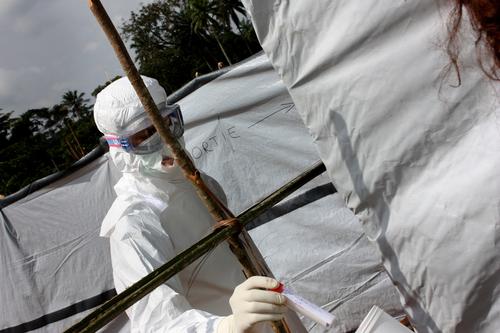The lead teams from Médecins Sans Frontières (MSF) who arrived in the Boende health zone, in Republic democratic of Congo (DRC) 10 days ago were bolstered on Wednesday of this week by the arrival of 17 specialists, including doctors, nurses, logisticians, pharmacists, and hygiene and sanitation specialists. In the next few days, this team will have as its primary mission the establishment of a treatment centre for patients presenting with symptoms of Ebola; it will also do outreach activities in the community. A total of 13 tonnes of equipment has already been shipped to Boende, and another 15 tonnes will be shipped within the next few days. However, MSF is concerned that there is still no mobile lab available.
The treatment centre for Ebola patients will be set up in Lokolia, the epicentre of the epidemic. This is a special operation, because this centre must have available to it all possible means for controlling transmission of the disease. Jeroen Beijnsberger, a MSF medical coordinator, explains that a treatment centre is organized based on a specific circuit that is designed to avoid any risk that the disease will escape to the outside. “Everything is strictly controlled. Whatever comes into the zone cannot leave, and this requires a substantial amount of logistical means,” he says.
A mobile laboratory is needed
However, MSF is concerned that the site still does not have a mobile lab. “We have made several contacts in the past few days to try and locate a mobile laboratory, but at present, no one has been able to help us. This is a very serious problem for us”, explains Jeroen Beijnsberger. A mobile laboratory is needed to enable doctors to confirm or eliminate the presence of Ebola in the blood of suspected patients within a few hours; this allows patients who are not infected to quickly leave the treatment centre and thereby avoid any risk of contamination. Without this type of laboratory, suspected patients have to be kept in the treatment centre for several days, with the end result being that the entire MSF facility could potentially become gridlocked and overcrowded with large numbers of patients. “We call upon all players to work together to quickly find a solution. This is now our priority”, stresses Jeroen Beijnsberger.
Educational activities
Lastly, educational activities are extremely important, right from the start of the operation. “We need everyone in the community to understand the importance of going to the treatment centre just as soon as symptoms appear. It’s crucial for patients and for their loved ones.” Personalised medical treatment can help the person fight the virus and improve his or her chances of a cure: “Here, we provide medical care and medications, we rehydrate the patients and we feed them. It’s critical that the body be sufficiently strong, in order to fight the virus.” It is also the only way to protect the patient’s family and close relatives from possible contamination.



